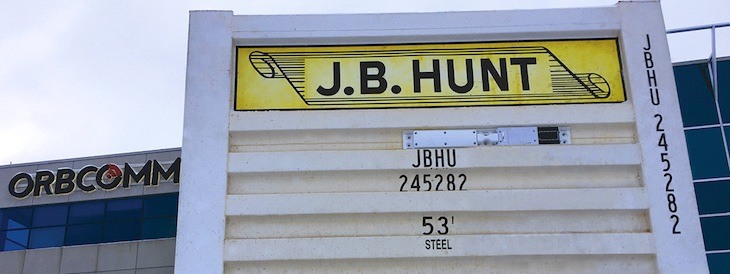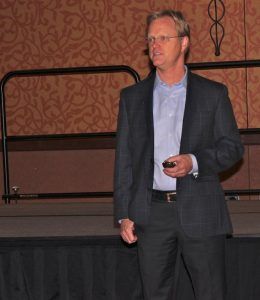J.B. Hunt’s cloud-based information system part of $500 million investment into technology
by October 17, 2017 6:07 pm 2,367 views

J.B. Hunt Transport Services will invest $500 million into technology over five years, and some of the money is being used to invest into a cloud-based system for its data. The Lowell-based carrier is building a cloud-based system but will continue to use its on-site data center and not replace it entirely with the system, said Gary Dowdy, head of innovation and disruptive technology for J.B. Hunt.
The move to a cloud-based system is a multi-million investment for companies with existing data centers, such as J.B. Hunt, but technology-driven startups don’t face this cost, which helps to explain their prevalence. On Tuesday (Oct. 17), Dowdy spoke on disruptive technologies and artificial intelligence in breakout session “Innovation: Macro Trends and Digital Transformation” during the Northwest Arkansas Technology Summit at the John Q. Hammons Convention Center in Rogers.
“We’re using machine learning to better match freight with capacity,” Dowdy said.
The carrier’s brokerage segment, Integrated Capacity Solutions, uses artificial intelligence to better match freight to capacity. He explained the matching capability is less Tinder, where it’s one time and done, and more eHarmony.
“We want to help the shippers save money and have a marketplace where people can compete for that freight,” Dowdy said. “At the same time, carriers don’t want to feel like they’re being pushed to a lower price, we have to help meet their needs.”
In April, John Roberts, president and CEO of J.B. Hunt, announced details of the matching technology “Marketplace,” as part of the carrier’s J.B. Hunt 360 transportation management system. The system allows carriers to make offers on available loads without people having to make phone calls in or out. “Pricing is being agreed to without people getting involved. The artificial intelligence behind the scenes is helping run those algorithms to make that pairing work,” Roberts said in April.
Over the next five years, artificial intelligence will put 10 million jobs at risk, Dowdy said. In this time, jobs such as cooks and servers could be replaced, but other positions such as truck drivers and nurses are at a low risk of being replaced.

In 10 years, Dowdy said he expects level-five autonomous trucks to be operating. This level of autonomy doesn’t require a driver to take control of the wheel at any time while the vehicle is in motion. Level-five autonomous cars are between three and five years away. It will take longer for trucks to reach level-five autonomous because of federal regulations.
Dowdy also explained the development of technology over the years, and how startups have used technology to disrupt nearly every industry, from the banking to hotel industries. He talked about how companies like Airbnb and Uber have changed the hotel and taxi businesses. Airbnb has no assets but is worth $24 billion, while Hilton has 4,610 hotels yet worth $22 billion. And, with Uber looking into the freight hauling industry, “this definitely has our attention.”
Other technology J.B. Hunt has implemented recently included installing sensors in its 100,000 containers and trailers. The company did this in response to customers wanting to know the location of their goods. Dowdy said the next step is to install sensors on individual pallets and boxes.
Shares of J.B. Hunt (NASDAQ: JBHT) closed at $102.42, up 79 cents or 0.78% on Tuesday. In the past 52 weeks, the stock has traded between $111.98 and $76.89.
